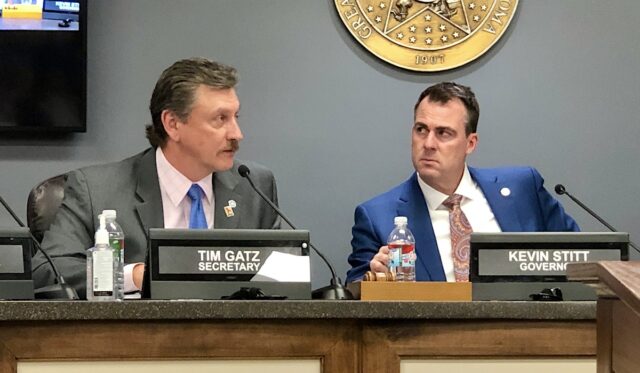
(Update: This article was updated at 2 p.m. Thursday, Feb. 29, to include reference to Lt. Gov. Matt Pinnell leaving Gov. Kevin Stitt’s Cabinet as secretary of workforce development.)
Shortly after Attorney General Gentner Drummond ruled that one person cannot serve as the head of two state roadbuilding agencies and as secretary of transportation, Tim Gatz resigned today from the governor’s Cabinet and as executive director of the Oklahoma Turnpike Authority. He will remain as executive director of the Oklahoma Department of Transportation, where he has worked for 34 years.
Drummond’s opinion was somewhat surprising, considering the practice of having a transportation secretary also serve as head of ODOT or OTA — or both — has occurred frequently in the last 30 years.
For the past five years, Gatz has served as secretary of transportation on Gov. Kevin Stitt’s Cabinet, while also serving as ODOT’s executive director and as executive director of OTA. Gatz, who started working for ODOT in 1990, was named its executive director in 2019, the same year Stitt appointed him to his Cabinet. Gatz had been named OTA’s executive director in 2016 under Gov. Mary Fallin.
Drummond said in his opinion that “this office finds that it is a violation of Title 51, Section 6 for a single individual to serve simultaneously in two or more roles as secretary, executive director of ODOT and executive director of OTA.”
Since a single individual cannot serve all three positions at the same time, the opinion states, an officeholder who takes a second office effectively has vacated that first office. The statute has been interpreted to bar teachers from serving in the Legislature, and a controversial Norman city councilman was accused of vacating his seat last year when he became a municipal judge in Wewoka.
Because Gatz was last named to his Cabinet post, he had in effect vacated the OTA and ODOT positions, both of which preceded his appointment to the Cabinet, according to Drummond’s opinion.
“The Oklahoma Supreme Court has long held that ‘entering upon the duties of a second office or acceptance of a prohibited office ipso facto operates as a vacation of the first office, notwithstanding the person’s intention of continuing to hold the first office,'” states the opinion, which was written by Drummond and Deputy Attorney General A. Chase Snodgrass. “Should a conflict of interest arise on the part of the appointing authority or should the officeholder attempt to maintain his vacated office(s) under color of title, relief may be obtained through civil action.”
Earlier Wednesday morning, Lt. Gov. Matt Pinnell emailed Stitt staff members to resign from the governor’s Cabinet position of secretary of workforce development. Emailed at 9:32 a.m., Pinnell’s Cabinet departure came as rumors of Drummond’s pending opinion had begun to swirl at the State Capitol.
“After careful consideration, I believe it is time for me to step away from the governor’s Cabinet and remove myself from the confirmation process,” Pinnell wrote. “With the number of boards and commissions that I currently serve on, and with the number of lieutenant governor requests for my time, I believe it’s the best path. I look forward to continuing to advise the governor on workforce and economic development issues.”
In the opinion, however, Drummond focused specifically on the question asked by a state senator about Gatz’s triple roles. Drummond said official actions by Gatz are valid and enforceable, despite him holding all three positions for the last five years.
“The Oklahoma Supreme Court has on numerous occasions held that public officials were de facto officers when lacking some qualification(s) to hold their office, but that their acts were valid when the interest of the public and third persons is involved,” the opinion states. “Therefore, official actions involving the public interest and third persons, though made by officials who are not qualified to serve but, without having prior notice otherwise, act as de factor officers under color of title, are valid, binding and enforceable.”
It’s been a common practice for members of a governor’s Cabinet to serve concurrently as the head of a state agency in addition to their duties as a Cabinet secretary.
“As of the time of writing, the Legislature has enumerated 30 exceptions to this prohibition,” Drummond wrote in the opinion. “However, none of these exceptions apply to the secretary of transportation, executive director of the Oklahoma Department of Transportation, or executive director of the Oklahoma Turnpike Authority.”
Since 1995, the secretary of transportation has also served as either the director of ODOT or director of OTA. Since then, seven of the eight transportation secretaries have served in one of those dual positions, with four serving in all three: Neal McCaleb, Herschal Crow, Gary Ridley and Gatz.
Stitt calls Drummond’s opinion ‘a pointless political attack’
In a statement released by ODOT and OTA, Gatz did not take a position on the legal analysis of Drummond’s opinion. Instead, he said he decided to resign his secretary of transportation position immediately and be reappointed as ODOT’s executive director, said Lisa Shearer-Salim, OTA’s communication and marketing manager.
“The opinion operates as an effective resignation of his role as the executive director of OTA,” Shearer-Salim said.
The OTA board, which last month recommended a pay raise for Gatz from $185,000 to $245,000, will ultimately appoint a new director. Gatz’s salary had been split between the two agencies, but his service as secretary of transportation carried no additional benefit.
Stitt was unhappy with Drummond’s formal opinion, calling it “a pointless political attack.”
“Tim Gatz has dedicated his career to serving the state of Oklahoma for 34 years,” Stitt said in a statement. “He is highly sought after by businesses and governments all over the country, but has chosen to stay here and serve his state. I am disappointed that he is the victim of a pointless political attack. I will continue to seek his guidance as he continues to lead the Oklahoma Department of Transportation as its director. His expertise and national reputation are essential to making Oklahoma a top 10 state.”
The opinion was requested by Sen. Mary Boren (D-Norman), who issued a statement thanking Drummond.
“I’m encouraged that the attorney general took the time to explain so thoroughly how Mr. Gatz is currently breaking the law by holding more than one office,” she said. “Hopefully, everyone responsible for creating this problem will work together to correct it by hiring new leaders for ODOT and OTA. Prompt compliance with the AG’s opinion will prevent further litigation and ensure that law and order is respected in our government.”
AG opinion backs new law affecting OTA board appointments
Drummond issued a second opinion involving the Oklahoma Turnpike Authority on Wednesday that was also unlikely to please Stitt.
In that non-binding opinion, Drummond supported a new law that gives the Legislature authority to make four appointments to the six-member board.
House Bill 2263, which was passed during last year’s legislative session and became law on Nov. 1, split the six appointments evenly among the governor, the speaker of the House and the president pro tempore of the Senate. Previously, all six members of the OTA board were appointed by the governor, who serves as an ex-officio member.
The opinion, written by Drummond and Deputy General Counsel Brad Clark, states that HB 2263 does not violate the Oklahoma Constitution’s separation of powers provision for three key reasons:
- Legislative acts are strongly presumed to be constitutional “unless it is clearly, palpably and plainly inconsistent with fundamental law”;
- The Legislature can provide for the appointment of executive offices by a person or entity other than the governor; and
- The measure is consistent with the balancing factor test used to determine the constitutionality of legislative appointments to state boards and commissions.
The legislation is not a power grab by the Legislature, Drummond wrote in the opinion, which was requested by Sen. John Haste (R-Broken Arrow).
“As a voting member with two appointments, the governor theoretically has more control than any other appointing authority,” the opinion states. “Spreading out the appointments and that the president pro tempore of the Senate utilized his appointing authority to reappoint the governor’s appointee to the authority further dissipates control, real and perceived.”
The OTA last month voted to file a lawsuit in Oklahoma County District Court challenging HB 2263. The case is pending.
At the time, Gatz said the board’s decision to pursue litigation should not be considered an adversarial action directed at the Legislature.
“This is something that has raised a shadow over the actions of the board, and we simply need clarity,” he said. “We need the question answered: Are we operating under a constitutional law or not?”
Shearer-Salim, OTA’s communication manager, said Wednesday the lawsuit was filed because it’s critical for the OTA board to have constitutional clarity to ensure that all board actions are undertaken with proper legal authorization and are not subject to legal challenge — legitimate or otherwise.
“Those types of challenges could impact OTA’s bond ratings and potentially increase costs for financing improvements to Oklahoma’s turnpike system,” she said.
HB 2263 passed easily in both chambers: 41-2 in the Senate and 82-2 in the House of Representatives. Stitt vetoed HB 2263 after its passage, but legislators overrode that veto and several others.
In his veto message, Stitt said the state constitution guarantees division of the powers of government, which shall not “exercise the powers properly belonging to either of the others.”
“Enrolled House Bill 2263 would shift the lion’s share of appointments to the Oklahoma Turnpike Authority, a non-appropriated entity, from the executive to legislative departments,” Stitt wrote. “Such a shift-from six members appointed by the governor to two members appointed by the governor and four members appointed by legislative leadership would codify legislative superiority and control over the operation of an executive branch agency and would enable the Legislature to exercise unconstitutionally coercive influence over the executive department.
“Simply put, although the Legislature declares policy, it cannot oversee the execution of the policy it declares.”
Drummond’s office receives OSBI inquiry
Earlier Wednesday, Drummond’s office confirmed that it had received the Oklahoma State Bureau of Investigation Commission’s request to investigate complaints against OSBI director Aungela Spurlock.
Drummond himself declined to discuss HB 3715, a bill filed by House Majority Whip Terry O’Donnell (R-Catoosa) to allow legislators to use surplus campaign funds to reimburse themselves for attorney fees following the successful defense of investigations and prosecutions.
Last year, Drummond dismissed a slate of criminal charges facing O’Donnell and his wife, who were indicted in December 2021 by a grand jury that alleged he had improperly run legislation allowing her to become a state-appointed tag agent.
“You know I’m not going to comment,” Drummond said. “Let the legislation pend, and then we’ll see where we are.”





















